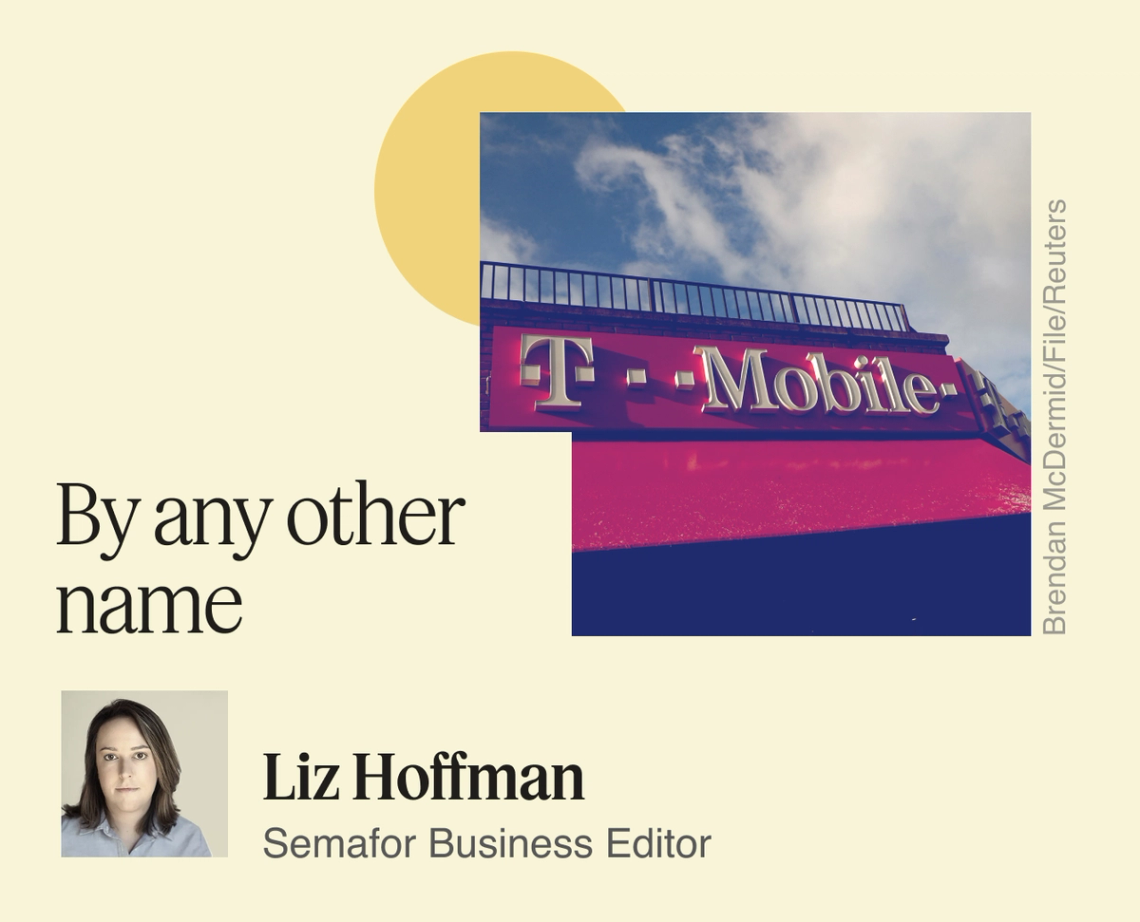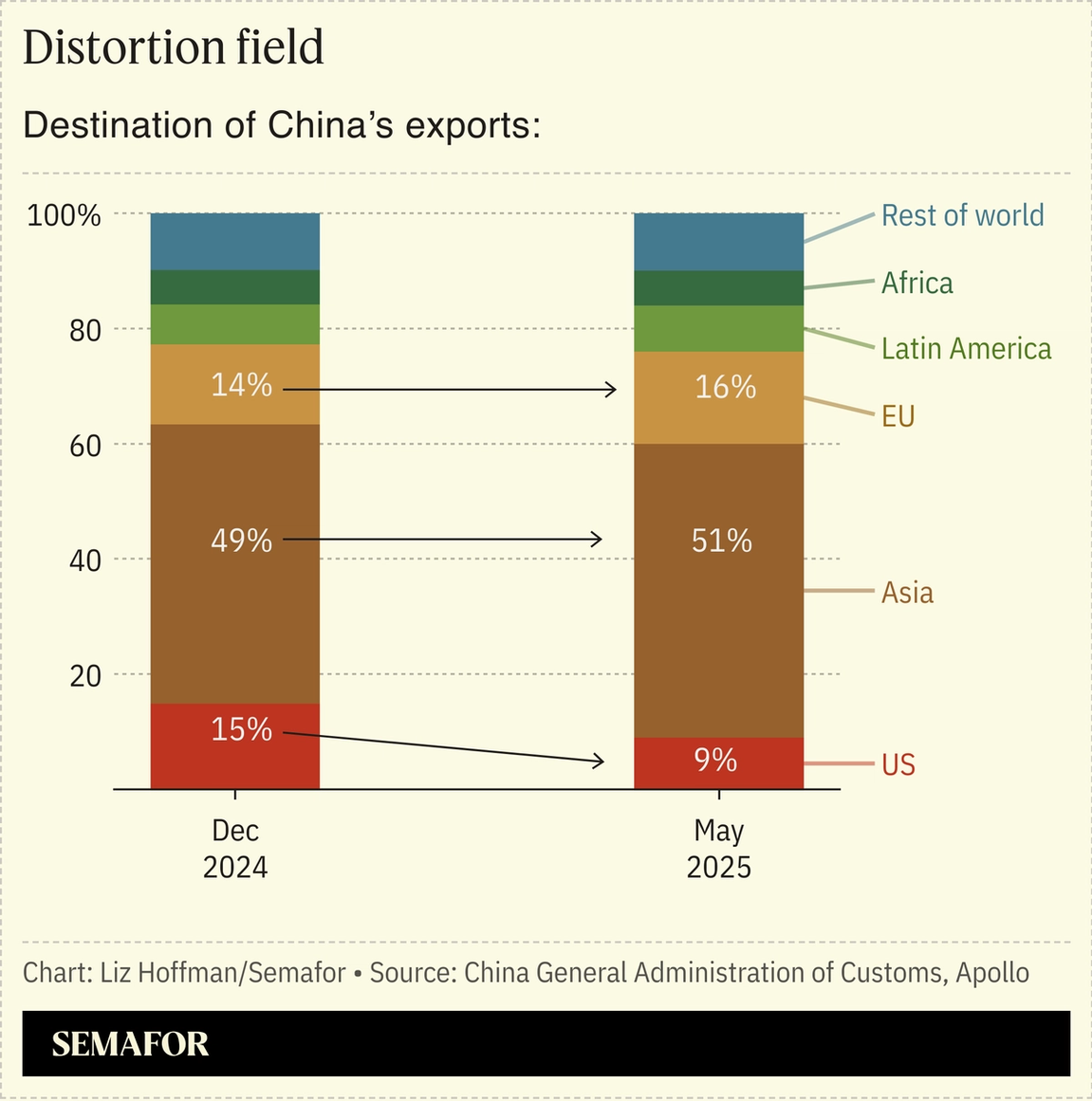| | In this edition, T-Mobile is the latest player to exit the DEI dance floor under pressure from the T͏ ͏ ͏ ͏ ͏ ͏ |
| |  | Business |  |
| |
|
 T-Mobile is the latest big company to back off diversity efforts in order to stay in the White House’s good graces. Its promise to the Federal Communications Commission this week to “no longer have any individual roles or teams focused on DEI” was enough of a win for FCC Chair Brendan Carr to post it to his X account, which he has used as a public ledger of strong-arm wins over the past few months. (The FCC is deciding whether to approve several T-Mobile deals.) But a closer read shows the linguistic dance that big companies are engaged in. DEI staffers will be “redirected to focus on employee culture and engagement,” T-Mobile said. What does that look like? Probably a lot like the status quo, minus some of its cringier performative steps. First came “greenwashing,” when companies repackaged business-as-usual as do-goodery. Now there’s “greenhushing,” the same process in reverse. Companies may be scrubbing their websites of “sustainability” but are talking more about “resilience.” They are abandoning some of the more explicit quotas — which were always borderline illegal — but executives I talk to haven’t given up on the idea that diversity in their workforces is good business. Outside of its goofier fringes, the DEI push always had a meritocratic bent. The Ivies don’t have a monopoly on smart people, and expanding the talent pool can bring in qualified candidates who might otherwise get missed. T-Mobile is now promising “equality of opportunity, performance-based rewards, and ensuring we’re a place where everyone can win.” Sensible goals under any acronym. And some big news at Semafor: Matthew Martin, Bloomberg’s Middle East scoops machine, joins us this week in Riyadh as our Saudi Arabia bureau chief. Read his first story here on a new entrant into Wall Street’s Gulf race, and stay tuned for more. |
|
Mamdani will try to charm CEOs |
 David ‘Dee’ Delgado/Reuters David ‘Dee’ Delgado/ReutersSome 300 capitalists and a socialist are about to work out their problems, or at least try. New York’s biggest CEOs will meet on Tuesday with Zohran Mamdani, the 33-year-old who won New York City’s mayoral primary with ambitious tax and spending plans. Mamdani will be interviewed by Pfizer CEO Albert Bourla — who told Semafor in January that Democrats had been “ideologically committed to hurt business” — and real-estate boss Rob Speyer at an event open to CEO members of the Partnership for New York City next week. The group’s members will also meet Thursday with Eric Adams, whose independent bid is seen as the best shot to beat Mamdani in November. Mamdani “called me and said he was very interested in introducing himself to the business community,” said Kathryn Wylde, the Partnership’s leader. “They don’t know him.” What they do know, they don’t like: Mamdani’s promises of free buses and childcare, refurbished schools, and new housing have to be paid for somehow. Some billionaires have threatened to leave, though the loudest alarm is coming from New York’s real-estate crowd, whose assets are stuck. “They want to hear that he’s not an ideologue,” Wylde said, “and that he’s willing to call on business expertise to deal with the challenges the city is going to face.” Those will be exacerbated by funding cuts in President Donald Trump’s new spending law. |
|
X’s future is AI, not ads |
 Mike Blake/File Photo/Reuters Mike Blake/File Photo/ReutersLinda Yaccarino’s exit as CEO of X surprised nobody in Silicon Valley or on Madison Avenue, though her two-year tenure beat the early odds. Her tall order — to bring back advertisers who had fled the platform — was undermined immediately when Musk told them to “go f*ck themselves,” and repeatedly, as he became a polarizing leader of the new right. Few believed her insistence that she had the reins, and while the platform is expecting a mild ad turnaround this year, her efforts to lure content stars like Don Lemon flopped. More importantly, Musk sees X’s future in AI, not ads, merging the service with xAI in a deal that subsumes it into his broader business empire. (Coming soon to Teslas: Grok, xAI’s chatbot, which was easily prompted by users this week — in the middle of a full Nazi tilt — to make lurid comments about Yaccarino.) |
|
The hunt for the next Fed Chair |
 Ken Cedeno/Reuters Ken Cedeno/ReutersRepublicans like Scott Bessent as Treasury secretary and would support him as Fed chair — just not at the same time. “You can’t have one foot in the independence camp and another foot in the political camp,” Sen. John Kennedy, a Republican who serves on the committee overseeing Fed nominees, told Semafor’s Eleanor Mueller and Burgess Everett. “We can’t clone him,” said Sen. Thom Tillis. With Trump continuing to criticize Jerome Powell for not cutting interest rates, speculation is swirling about who might replace him. In addition to the two Kevins, Trump advisers have reportedly floated having Bessent take the job while remaining Treasury secretary. The White House has denied it, though it comes amid a broader discussion about whether Fed officials — whose initial misread on inflation dinged its reputation — should be more accountable (read: political). The Treasury secretary was the Fed chair until 1935, when the two jobs were separated to “increase the [Federal Reserve] Board’s power to resist political pressure,” as one of the change’s biggest proponents, Marriner Eccles, testified at the time. NB: He also said, at the same hearing: “You know, gentlemen, as well as I do, that no man would stay on the Board if the President of the United States wished to appoint someone else in his place.” |
|
Zionist professor leaves Columbia Business School |
 Katie Smith/Sipa USA via Reuters Katie Smith/Sipa USA via ReutersA vocally pro-Israel professor who became a visible face of the broader fight over free speech on university campuses is leaving Columbia Business School, Semafor scooped. Shai Davidai, a polarizing figure on campus since the Oct. 7 attacks on Israel, was barred from campus last year after the university found he “harassed and intimidated” employees. He had accused administrators of failing to crack down on pro-Palestinian demonstrations, and posted videos of student activists online whom he accused of antisemitism. The departure of a staunchly pro-Israel professor could upend Columbia’s efforts to reach a deal with the Trump administration over its handling of antisemitism. The university is trying to retain autonomy over its operations and billions of dollars in federal funding. |
|
A trade world without Trump |
If global leaders can’t go through Trump, they’ll go around him. New bilateral routes are deepening that sidestep the US, distorting trade patterns and diplomatic ties in ways that are likely to outlast this administration.  Brazil — which received the sharpest of Trump’s trade letters this week — agreed to almost double its trade with India to $20 billion and collaborate on defense, clean energy, and agriculture, after hosting a summit of the BRICS bloc of mostly developing nations. At a separate regional summit this week, Malaysia touted “growing economic interdependence” with China after they finalized a regional NAFTA-like agreement in May. And in a few weeks, China and the European Union are going to hold a one-day summit in Beijing, despite their own myriad disputes. “Can things return to the way they were? Yes, but there’s a real cost, like going home and asking your spouse, ‘Should we get divorced?’ ” Neuberger Berman CEO George Walker IV told Semafor this spring. “Even if you come back and say ‘I’m committed’ … that conversation changes things.” |
|
Media moguls land, humbled, in Sun Valley |
 Brendan McDermid/Reuters Brendan McDermid/ReutersChange is in the air in the media world, and its billionaires are in Idaho looking to capitalize. The Allen & Co. Sun Valley conference has midwived megadeals over the years, including Comcast-NBCUniversal and Jeff Bezos’ purchase of The Washington Post. But today’s moguls face a scrambled world, with YouTube eating television, media companies in Trump’s crosshairs, and a Darwinian competition for the last appointment-viewing content — sports. Streaming replaced the cable bundle, but without the big profits. At last year’s Sun Valley gathering, Warner Bros. Discovery CEO David Zaslav predicted a wave of media M&A, little of which has materialized beyond the breakup of his own company. Whatever deals come out of this year’s billionaire summer camp are likely to be less about building empires than guarding flanks — or selling out to private-equity firms willing to manage the decline. Forgive the lack of swagger, Variety writes. |
|
 Matthew Martin. Semafor. Matthew Martin. Semafor.We are ramping up our investment in the Gulf: Matthew Martin, the veteran Bloomberg reporter, has joined Semafor as Saudi Arabia bureau chief and global head of sovereign wealth fund coverage. Martin brings deep expertise on Gulf wealth funds’ roles in revamping their economies and projecting soft power abroad. |
|
➚ BUY: Loons. Canada’s dollar edged up Thursday and has gained 7% against the US greenback since January. ➘ SELL: Tunes. The soaring cost of music licensing is harshing the vibe at small restaurants and bars, costing as much as 15% of pre-tax profits. House Republicans have asked US copyright regulators to look into it. |
|
 Companies & Deals- Walking the talk: Andreessen Horowitz is reincorporating out of Delaware and urging its portfolio companies to follow. Despite Delaware’s efforts to keep its corporate citizens, a16z — whose leaders share the politics of Musk, another #Dexiteer — is headed to Nevada.
|
|
|